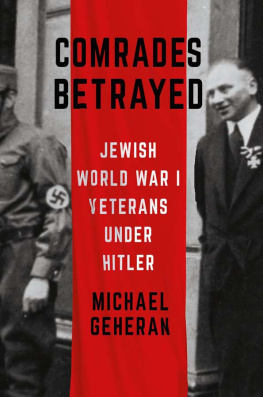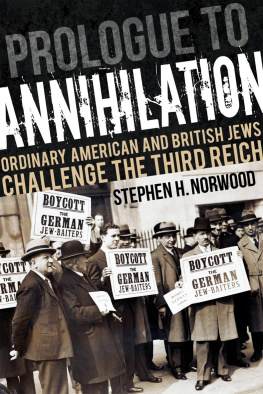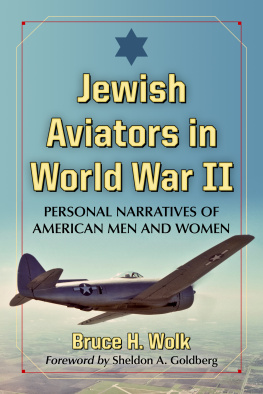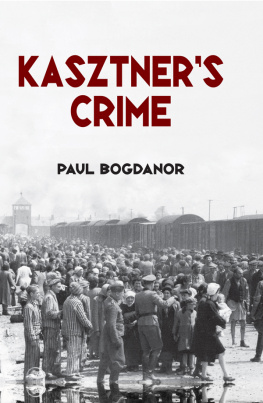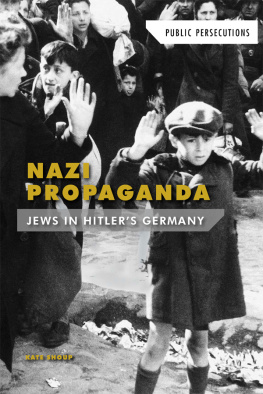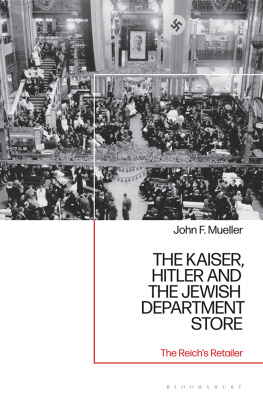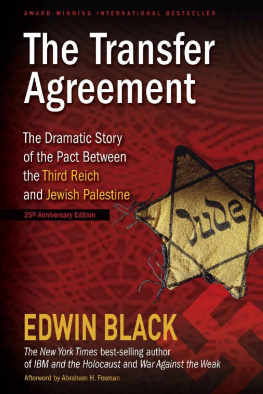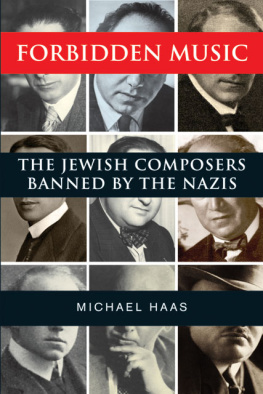
To my parents, John and Christa, in love and gratitude,
and my wife, Anna, for being my partner in every adventure
Acknowledgments
A few sentences could never fully express my gratitude to everyone who helped bring this project to fruition. Without the assistance from my mentors, colleagues, friends, and family, and the support of key institutions, I simply could not have done this work.
First and foremost, I wish to express my deepest gratitude to Thomas Khne. His meticulous and at times highly critical feedback made my work immeasurably better, and over the years he introduced me to a community of scholars with similar interests, which has expanded my academic universe immensely. I would also like to thank Geoffrey Megargee and Omer Bartov, who offered invaluable counsel, criticism, and encouragement over many years, and who suffered through all of the projects various iterations. I have been blessed to receive assistance from many individuals who have given their time to read and comment on sections of the manuscript at varying stages. For this, I am indebted to Dirk Bnker, Jason Crouthamel, and Dennis Showalter, as well as Benjamin Ziemann, Andrew Donson, and Erika Kuhlman, who reviewed the draft manuscript for Cornell University Press. I count myself lucky to have learned from their scholarship, example, and wisdom; any shortcomings and errors are mine alone.
Over the years, I have profited enormously from professional interactions and personal conversations with numerous brilliant individuals, who have inspired me in ways they may not be fully aware of. In particular, I would like to say thank you to Taner Akam, Betsy Anthony, Frank Bajohr, Sarah Cushman, Werner Dirks, Magorzata Domagalsk, Debrah Dwork, Stefanie Fischer, Roland Flade, Jrgen Frster, Tim Grady, Anna Hjkov, Ainslie Hepburn, Peter Lande, Natalya Lazar, Andrea Lw, Jrgen Matthus, Eliot Nidam, Michael Nolte, Darren OByrne, Devlin Scofield, Matthew Shields, Joanna Sliwa, Jaan Valsiner, Michael Wildt, and Kim Wnschmann. I am also appreciative of Richard Card for his editorial and stylistic advice.
The Strassler Center for Holocaust and Genocide Studies at Clark University brought me into contact with a warm, talented, intellectually curious group of colleagues. I could think of no more nurturing home for a long academic journey. A gracious thanks to my fellow graduate students at the Strassler Center. With great compassion and humor, we have shared our work and worries with one another, offering constructive critique and repairing one anothers egos when necessary.
David Frey, Colonel Gail Yoshitani, and Lieutenant Colonel Nadine Ross, along with other members of the Department of History at the United States Military Academy, provided an invigorating environment in which to pursue history, all while we endeavored to teach the skills of our discipline to new generations of future officers. I cannot think of a more exciting place to be a history professor.
I am also enormously grateful to Emily Andrew and the editorial team at Cornell University Press, for the enthusiasm with which they have seen this book through from conception to publication. A special thanks to Alexis Siemon, who offered meticulous yet kind assistance throughout production. In the end, I could not have hoped for a smoother production and review process.
I am also indebted to the many Holocaust survivors and their family members who gave so much of themselves when they agreed to be interviewed for this project. Their contributions are truly inestimable. Many thanks to Johanna Neumann, Kaethe Wells (Schohl), Gerald Weiss, Roger Trefousse, Marion Blumenthal Lazan, Ernest Haas, Lorenz Beckhardt, and Yvonne Klemperer. Many collections of letters and documents remain in private hands, usually in the possession of family members. I am particularly indebted to Ulrich Lewin, who shared his fathers surviving military records, photographs, and private letters with me.
I want to thank the numerous institutions that have generously supported my work. This book was made possible (in part) by funds granted to me through an L. Dennis and Susan R. Shapiro Fellowship at the Jack, Joseph and Morton Mandel Center for Advanced Holocaust Studies of the United States Holocaust Memorial Museum. The statements made and views expressed in it, however, are solely my responsibility. I am also grateful to the Emerging Scholars Program at the Mandel Center for its support in the preparation of the manuscript and of the book proposal. Much gratitude is owed to Jo-Ellyn Decker, Suzanne Brown-Fleming, Steven Feldman, Robert Ehrenreich, Megan Lewis, and the wonderful staff at the USHMM, who provided efficient and valuable assistance as well as kindness and hospitality. In addition to introducing me to numerous scholars with shared interests, my involvement with the German Historical Institute has deepened my knowledge of modern German history and the Nazi period. A grant from the Fulbright Commission made it possible for me to spend over a year in Germany conducting preliminary research for this project. I am also grateful to have received funding from the Leo Baeck Institute, the Society for Military History, the Central European History Society, the German Academic Exchange Service (DAAD), the International Institute for Holocaust Research at Yad Vashem, and the Conference on Jewish Material Claims against Germany.
Most importantly, however, this endeavor would never have been possible without the lifelong, unconditional love and support of my parents, John and Christa Geheran, who instilled in me a passion for learning and a strong work ethic at a young age. Their unwavering encouragement, interest, and enthusiasm sustained me throughout my studies and early career. My late grandparents, Anna and Emil Bellinger, gave me a love of history that has endured. Perhaps my greatest supporter has been my wife, Anna. She has shouldered enormous burdens taking care of our beautiful daughter, Karoline, while I completed the manuscript, and listened to more discussions about World War I and Nazi Germany than any nonhistorian should ever have to endure. Her patience and support cannot be measured, and she has once again proven that I am the lucky one in our marriage. I cannot thank them enough; I dedicate this manuscript to each of them in love and gratitude.
Abbreviations
| BA-MA | Bundesarchiv-Militrarchiv, Freiburg |
| BArch | Bundesarchiv, Berlin |
| BayHStA/II | Bayerisches Haupstaatsarchiv, Munich |
| BHStA/IV | Bayerische Hauptstaatsarchiv, Abt. IV, Kriegsarchiv, Munich |
| CV | Central Association of German Citizens of Jewish Faith
(Centralverein deutscher Staatsbrger jdischen Glaubens) |
| DTA | Deutsches Tagebucharchiv, Emmendingen |
| HHL | Harvard Houghton Library |
| HStADD | Haupstaatsarchiv Dresden |
| HStAD | Haupstaatsarchiv Dsseldorf |
| HStAS | Hauptstaatsarchiv Stuttgart |
| IfZ | Institut fr Zeitgeschichte, Munich |
| JMB | Jdisches Museum Berlin |
| LBINY | Leo Baeck Institute, New York |
| NCO | noncommissioned officer |
| NIOD | NIOD Instituut voor Oorlogs-, Holocaust- en Genocidestudies, Amsterdam |
| NSDAP | National Socialist German Workers Party
(Nationalsozialistische deutsche Arbeiterpartei) |
| OKH | Army High Command
(Oberkommando des Heeres) |
| OKW | Wehrmacht High Command
(Oberkommando der Wehrmacht) |
Next page
